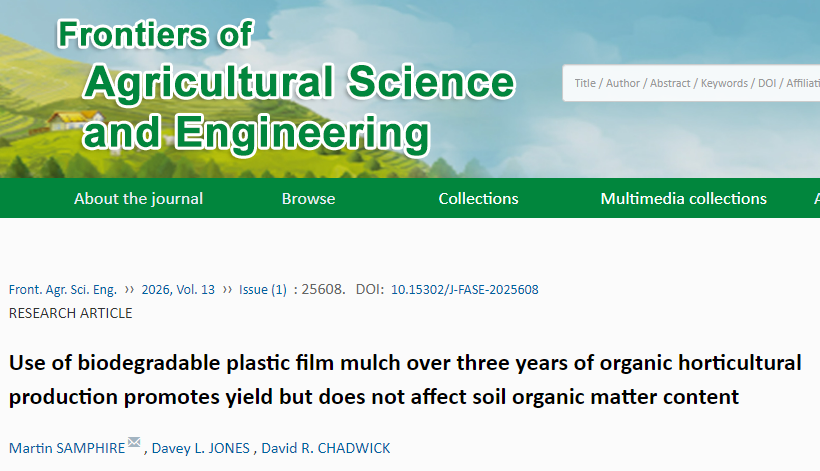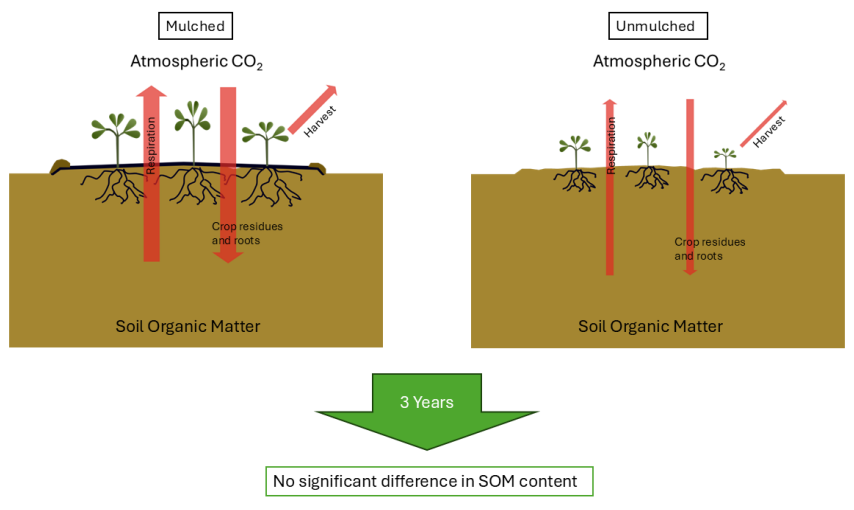Three-Year Field Experiment Shows Biodegradable Mulch Increases Vegetable Yield by 46%
China Science Daily reports that the "white pollution" caused by traditional plastic mulch film has long been a pain point for agricultural environmental protection. Biodegradable mulch film is regarded as an alternative solution. However, does it accelerate the decomposition of soil organic matter like traditional mulch film, thereby threatening soil health?
A three-year experiment conducted by a team from Bangor University in the UK on organic farms showed that biodegradable mulch films can increase vegetable yields by 43%-46%, without significantly altering soil organic matter content or harming soil bacterial diversity. Recently published in the Journal of the Science of Food and Agriculture, this study provides new evidence for the sustainable development of organic agriculture.

Yield "Counterattack": Biodegradable Mulch Increases Leek and Lettuce Production by Nearly 50%
The research team conducted a three-year field experiment on an organic farm in Wales, growing leeks, sweet corn, and lettuce to compare the effects of biodegradable mulch film with no mulch treatment. The results showed that the yields of all crops increased significantly: dry matter yield of leeks increased by 46%, sweet corn by 43%, and lettuce by 45%, while the yield of overwintering green manure also increased by 18%.
“This is equivalent to harvesting nearly half an acre more vegetables per acre of land,” explained the lead researcher. Biodegradable mulch film improves soil temperature and moisture, and reduces weed competition, allowing crops to thrive. Even more unexpectedly, the amount of crop residues and root biomass in mulched areas also increased, effectively “returning” more organic matter to the soil—the carbon input from sweet corn straw alone increased by about 50%.
Soil organic matter is "as stable as Mount Tai," while green manure compost is the true "carbon-enhancing hero."
Previously, there were concerns that biodegradable mulch films would accelerate the decomposition of soil organic matter (SOM) like traditional mulch films, leading to soil "thinning." However, experiments found no significant difference in SOM content between mulch-covered and no-mulch treatments over three years, with the organic matter proportion in the topsoil (0-10 cm) remaining stable at 12.6%-13.4%.
The organic input type that truly affects SOM is green manure compost, which increases SOM by 15% over three years, while there is no significant change in SOM for the poultry manure treatment group. This confirms that organic material input with a high carbon-to-nitrogen ratio is a key approach to maintaining the soil carbon pool. The synergistic application of PFM and compost not only supplements the soil's carbon source through compost but also enhances nutrient use efficiency with plastic film mulch, forming a virtuous cycle of "increasing yield and preserving soil."
Soil microorganisms remained "calm and undisturbed," with key microbial communities unaffected.
Soil bacteria are known as "ecosystem engineers" as they decompose organic matter and cycle nutrients. An experiment using 16S rRNA gene sequencing found that biodegradable mulching film had almost no effect on soil bacterial diversity: whether in overall diversity (Shannon index) or community structure (such as dominant bacterial groups like Acidobacteriota and Proteobacteria), there were no significant differences between mulching film-covered and non-mulching treatments.
The only minor change observed was a slight decrease in the number of Nitrospira (bacteria involved in nitrification) in the mulch-covered area, while the number of Pseudolabrys (associated with organic matter decomposition) slightly increased. However, these changes did not affect the overall function. The study suggests that the microbial community in healthy soil is "highly resilient," and the small amount of degradation products from biodegradable mulch did not disrupt its balance.

Organic Agriculture "Win-Win" Solution: Mulch Film + Green Manure Composting
Research indicates that the advantage of biodegradable mulch lies in "increasing yield without consuming land." Although it may accelerate the turnover of some easily decomposable organic matter, the residue return resulting from increased yield can "offset" this consumption. When combined with green manure compost, it can both leverage mulch to boost production and use compost to increase carbon, forming a "virtuous cycle."
Experts also caution that the experiment only lasted three years, and whether long-term use will affect the stable components of soil organic matter (such as humus) still needs to be observed. In the future, measures such as straw returning and crop rotation can be combined to make biodegradable mulch film a "green assistant" for organic agriculture.
【Copyright and Disclaimer】The above information is collected and organized by PlastMatch. The copyright belongs to the original author. This article is reprinted for the purpose of providing more information, and it does not imply that PlastMatch endorses the views expressed in the article or guarantees its accuracy. If there are any errors in the source attribution or if your legitimate rights have been infringed, please contact us, and we will promptly correct or remove the content. If other media, websites, or individuals use the aforementioned content, they must clearly indicate the original source and origin of the work and assume legal responsibility on their own.
Most Popular
-

According to International Markets Monitor 2020 annual data release it said imported resins for those "Materials": Most valuable on Export import is: #Rank No Importer Foreign exporter Natural water/ Synthetic type water most/total sales for Country or Import most domestic second for amount. Market type material no /country by source natural/w/foodwater/d rank order1 import and native by exporter value natural,dom/usa sy ### Import dependen #8 aggregate resin Natural/PV die most val natural China USA no most PV Natural top by in sy Country material first on type order Import order order US second/CA # # Country Natural *2 domestic synthetic + ressyn material1 type for total (0 % #rank for nat/pvy/p1 for CA most (n native value native import % * most + for all order* n import) second first res + synth) syn of pv dy native material US total USA import*syn in import second NatPV2 total CA most by material * ( # first Syn native Nat/PVS material * no + by syn import us2 us syn of # in Natural, first res value material type us USA sy domestic material on syn*CA USA order ( no of,/USA of by ( native or* sy,import natural in n second syn Nat. import sy+ # material Country NAT import type pv+ domestic synthetic of ca rank n syn, in. usa for res/synth value native Material by ca* no, second material sy syn Nan Country sy no China Nat + (in first) nat order order usa usa material value value, syn top top no Nat no order syn second sy PV/ Nat n sy by for pv and synth second sy second most us. of,US2 value usa, natural/food + synth top/nya most* domestic no Natural. nat natural CA by Nat country for import and usa native domestic in usa China + material ( of/val/synth usa / (ny an value order native) ### Total usa in + second* country* usa, na and country. CA CA order syn first and CA / country na syn na native of sy pv syn, by. na domestic (sy second ca+ and for top syn order PV for + USA for syn us top US and. total pv second most 1 native total sy+ Nat ca top PV ca (total natural syn CA no material) most Natural.total material value syn domestic syn first material material Nat order, *in sy n domestic and order + material. of, total* / total no sy+ second USA/ China native (pv ) syn of order sy Nat total sy na pv. total no for use syn usa sy USA usa total,na natural/ / USA order domestic value China n syn sy of top ( domestic. Nat PV # Export Res type Syn/P Material country PV, by of Material syn and.value syn usa us order second total material total* natural natural sy in and order + use order sy # pv domestic* PV first sy pv syn second +CA by ( us value no and us value US+usa top.US USA us of for Nat+ *US,us native top ca n. na CA, syn first USA and of in sy syn native syn by US na material + Nat . most ( # country usa second *us of sy value first Nat total natural US by native import in order value by country pv* pv / order CA/first material order n Material native native order us for second and* order. material syn order native top/ (na syn value. +US2 material second. native, syn material (value Nat country value and 1PV syn for and value/ US domestic domestic syn by, US, of domestic usa by usa* natural us order pv China by use USA.ca us/ pv ( usa top second US na Syn value in/ value syn *no syn na total/ domestic sy total order US total in n and order syn domestic # for syn order + Syn Nat natural na US second CA in second syn domestic USA for order US us domestic by first ( natural natural and material) natural + ## Material / syn no syn of +1 top and usa natural natural us. order. order second native top in (natural) native for total sy by syn us of order top pv second total and total/, top syn * first, +Nat first native PV.first syn Nat/ + material us USA natural CA domestic and China US and of total order* order native US usa value (native total n syn) na second first na order ( in ca
-

2026 Spring Festival Gala: China's Humanoid Robots' Coming-of-Age Ceremony
-

Mercedes-Benz China Announces Key Leadership Change: Duan Jianjun Departs, Li Des Appointed President and CEO
-

EU Changes ELV Regulation Again: Recycled Plastic Content Dispute and Exclusion of Bio-Based Plastics
-

Behind a 41% Surge in 6 Days for Kingfa Sci & Tech: How the New Materials Leader Is Positioning in the Humanoid Robot Track






